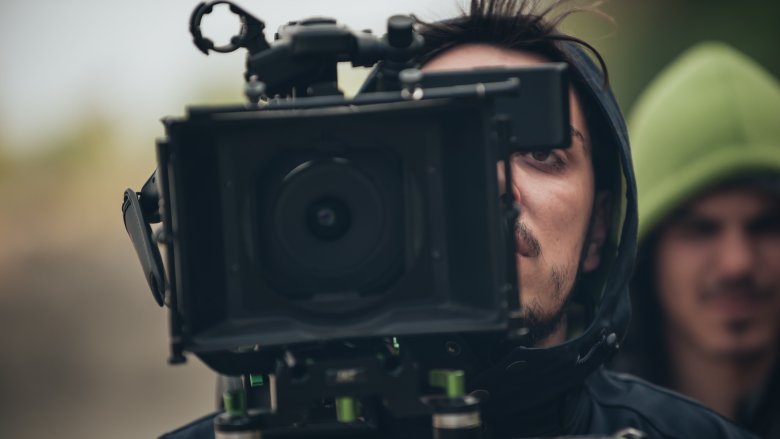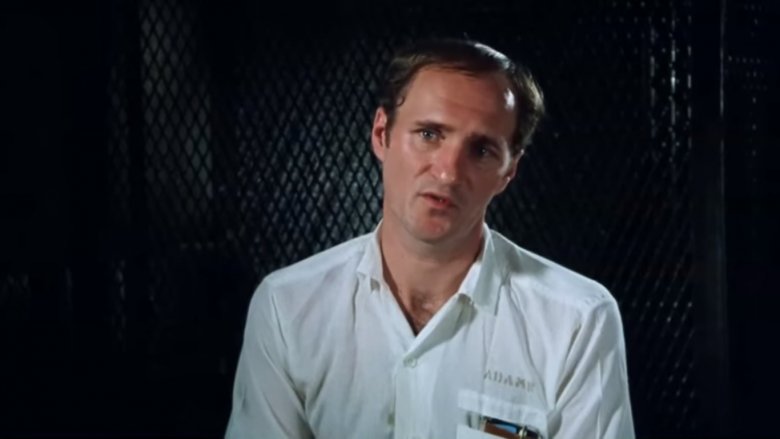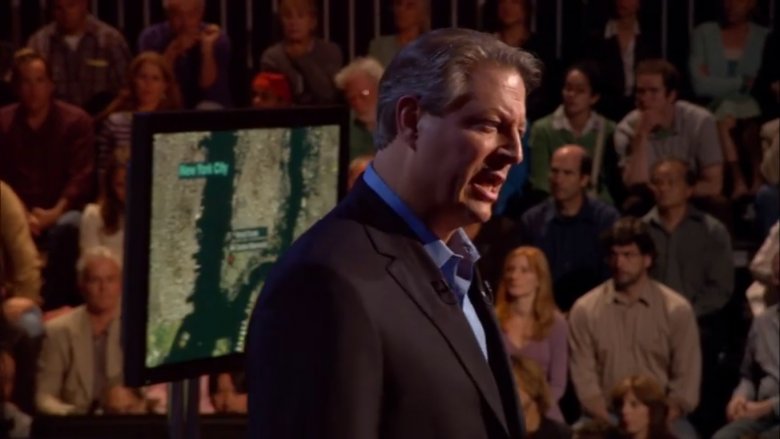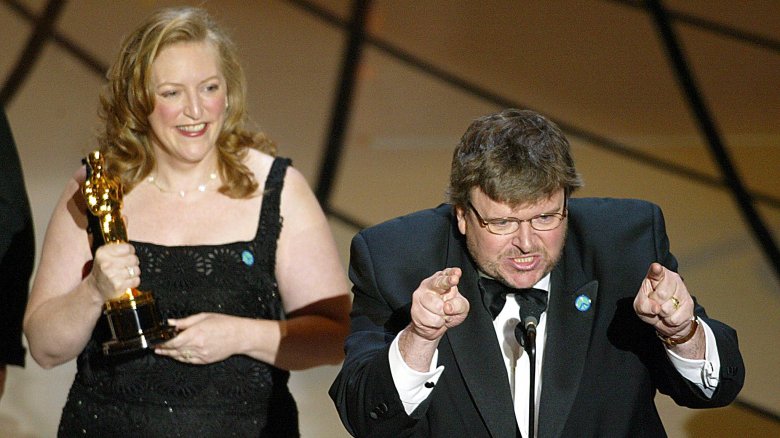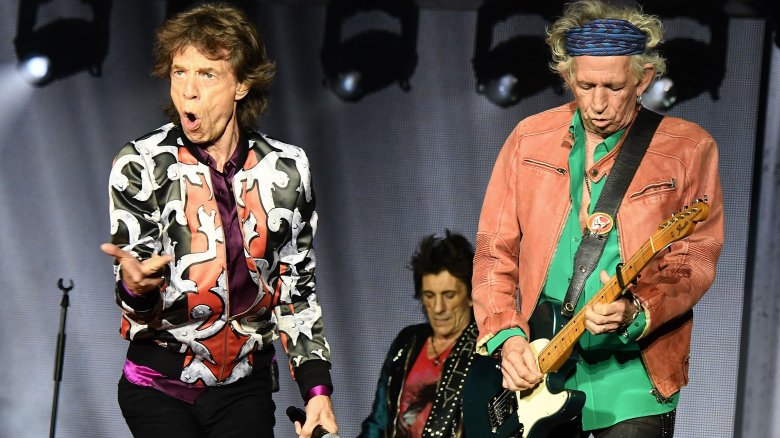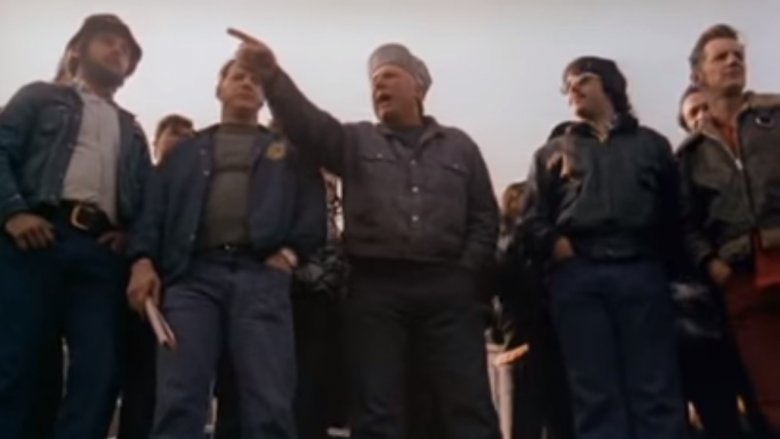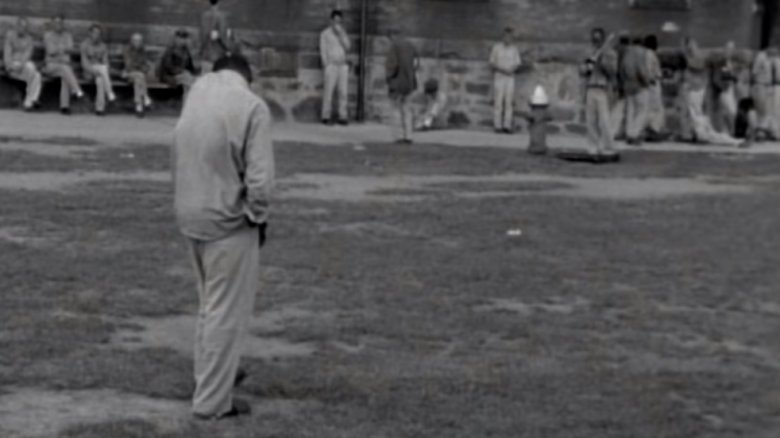Documentaries That Actually Changed The World
What are documentaries for? On a basic level, you'd think their purpose is to bring the spotlight to a significant piece of real life — to tell somebody's story, or the struggle of a people, or a movement that takes place within a certain culture. They can be about history, music, politics, celebrities, food, crime, and quite literally anything else under the sun — or beyond it. In short, they're supposed to capture things that happen.
Sometimes, however, the documentaries are the things that happen. Every once in a while, a film or series is released that is so profound, so important, so cataclysmic on a wider social and cultural level, that it sets in motion a string of events that are themselves worthy of recording. Here, we're documenting the incidents that happened as a result of somebody documenting a different incident. "Meta" doesn't even begin to cover it. These documentaries arguably changed the world.
Blackfish saves the whales
Released in 2013, Blackfish followed the life of Tilikum, an orca whale notorious for his lethal history during his captivity at SeaWorld. The film covers Tilikum's capture near Iceland in 1983, his struggles to adapt to life at SeaWorld and the attacks, some fatal, Tilikum has launched on his trainers and captors.
Change didn't come immediately in the wake of Blackfish's release. However, the film raised awareness about the plight of marine animals in captivity and provoked a number of protests against SeaWorld in particular, many of which were led or endorsed by celebrities. The park was hit hard. Though they're making a small rebound lately, SeaWorld's stock eventually lost more than two-thirds of its value since the film's 2013 release, visitor numbers have fallen significantly, and profits have sunk to all-time lows. Finally, in 2017, SeaWorld announced it would rebrand as a conservation group rather than an entertainment company — and that the park's orca shows would finally be phased out.
An innocent man goes free
The Thin Blue Line was a 1988 documentary about a death row inmate named Randall Dale Adams, who had been convicted of the 1976 murder of a police officer in Dallas. His death sentence was almost carried out, too: Only three days before his scheduled execution in 1979, a stay was issued when it was revealed that anti-death penalty citizens were excluded from selection to the jury. Shortly afterward, Adams' sentence was commuted to life in prison.
Filmmaker Errol Morris arrived in Dallas in 1985 to begin work on a documentary about a prison psychiatrist. During filming, Morris met Adams and soon became engrossed in his case. Morris' own investigation revealed that witnesses during the case had committed perjury, statements made by Adams had been misconstrued by the police, and prosecutors had ignored another potential suspect because he was too young to be executed under Texas law. All of this was documented in The Thin Blue Line. After the film's release in 1988, a public outcry spurred a judge into hearing an appeal against the conviction and, a year later, Adams was released. He received no compensation from the state of Texas.
A very, very inconvenient truth
Considering how ubiquitous it is in our current political discourse, it's hard to imagine a time before everyone knew about climate change. It wasn't that long ago, however, that nobody cared about it at all. That changed, however, with the release of An Inconvenient Truth. Directed by Davis Guggenheim, this 2006 documentary covered Al Gore's campaign to increase U.S. awareness about global warming. An Inconvenient Truth was a critical and commercial smash: It won two Academy Awards and grossed $24 million domestically, a seriously good figure for a documentary.
The film's most important success, however, was — according to glaciologist Lonnie Thompson — getting "climate change on the radar." Suddenly, a fringe issue had been brought to the fore. In 2015, almost a decade after the film's release, 195 nations came together to sign the Paris Accord, an agreement meant to spur the world into fighting back against climate change.
Josh Fox fracks it all up
Josh Fox's 2010 documentary Gasland offered an insight into the rural American communities which had been negatively impacted by drilling for natural gas — and, more specifically, a certain method of drilling known as fracking. Basically, hydraulic fracturing is a way to split open rocks deep underground to get at oil or gas. Fox had been contacted by a natural gas company in 2008 with an offer of $100,000 to lease his family's land for fracking. The purpose of his film was to tell the stories of residents of communities which lived on land affected by fracking in a number of states across the country. Gasland revealed that the effects of fracking include severe health issues and water contamination.
A 2015 study revealed that Gasland's release had spurred a significant rise in news coverage, activism, and online discussion regarding the effects of fracking. The public outrage which ensued has forced a number of municipalities across America to regulate the practice, and the state of New York even banned fracking altogether.
McDonald's ends up in the hot seat
Super Size Me is one of the world's most famous documentaries. Directed and featuring filmmaker Morgan Spurlock, it follows Spurlock as he embarks on a 30-day odyssey in which he only eats food purchased from McDonald's. Super Size Me traces his physical and psychological decline during and after that 30-day period, shining a light on the ways fast food corporations entice people into eating their food at the cost of their well-being.
All in all, Spurlock ended that month depressed, incapable of performing in the bedroom, and 18 pounds heavier than he started. Since the release of the film, fast food restaurants have made a point of adding more salad and fruit options to their menus. McDonald's itself, meanwhile, has done away with the "supersize" option, but the company denies that the film influenced their decision. Super Size Me also contributed to the rise of so-called "clean eating," a lifestyle that encourages label-reading and calorie-watching to an extent that, according to nutritionist Christy Harrison, can itself be considered dangerous. Moderation, people!
Justice for Columbine
Unarguably Michael Moore's finest hour, Bowling for Columbine was a 2002 film that explored the background of the 1999 Columbine High School massacre. Moore interviewed a number of celebrities and political figures on their attitudes toward violence and gun crime in the United States. The film discussed weapons manufacturing, social fear, arms sales to citizens, and American foreign policy, among a number of other topics.
In one section of the film, Moore and survivors of the Columbine shooting travel to the headquarters of Kmart to attempt to claim a refund for bullets sold by Kmart that are lodged in their bodies. They also asked the store to stop selling ammo. Soon after meeting with Moore to film that segment, and even before the release of Bowling for Columbine, Kmart decided to end its sales of handgun ammunition. Moore told the media that he was "totally, totally stunned by the response from Kmart."
A Hells Angel is vindicated
1970's documentary Gimme Shelter (named for a song by the band it covered) followed the final weeks of the Rolling Stones' 1969 tour of the United States, culminating with a notorious show at the Altamont Free Concert. The Altamont Free Concert was a disaster. Security for the event was provided by the Hells Angels, and things soon went exactly how you'd expect: Fights broke out, musicians declined to play, and Mick Jagger was punched in the face within seconds of arriving via helicopter.
The nadir of the Stones' show was the killing of a fan, Meredith Hunter, by a Hells Angel named Alan Passaro. Passaro was arrested and charged with murder, but footage taken by one of the documentary crew's camera operators eventually shed light on what really happened. Hunter, who was high and drunk at the time, was approaching the stage holding a .22 revolver when Passaro leapt on him with a knife. The footage was shown in court and ended up exonerating Passaro, who was deemed to have acted in self-defense.
A director's eye keeps the peace
Barbara Kopple's Oscar-winning documentary Harlan County, USA was filmed in 1976 and covered the Brookside Strike, a dispute between coal miners and a power company in Harlan County, Kentucky. The film tells the story of the strike from the perspective of Lois Scott, the wife of one of the miners, who founded the Brookside Women's Club. The group of wives picketed the entrance of the mines, successfully loopholing a court ruling that only four workers could picket at any one time.
Violence soon broke out. The miners began to brandish weapons, including baseball bats, switchblades and, eventually, firearms. Kopple's presence, however, likely prevented a further deterioration of the situation: She and her crew kept the cameras rolling even when they ran out of film, knowing that neither party wanted to be caught on film as having started the fight. Although she couldn't prevent the eventual death that did occur, many lives were doubtless saved by Kopple and her crew.
The follies of Bridgewater
Released in 1967, Titicut Follies provided a shocking insight into the lives of inmates at the Bridgewater State Hospital for the criminally insane. Kept in bare cells, force-fed, bullied, and routinely humiliated, the inmates were entirely at the mercy of the hospital's staff — and Titicut Follies was the first time the practices at the institution were exposed to the public eye.
The film was initially censored by the government, which claimed it violated the privacy rights of the inmates. Eventually, it was ruled that the film could be shown only to professionals in the fields of law, medicine, and social work. In 1991, however, a judge finally ruled that the film could be shown to the public because most of the inmates had since died and their privacy was less of a concern. Many have credited the film with raising awareness of issues in America's mental health system, though Frederick Wiseman, who directed the film, has since downplayed that angle. He does, though, at least suggest that Titicut Follies' release may have contributed to the eventual closure of Bridgewater itself. Just how much impact the film alone had, however, may never really be known.
The TV show that inspired a revolution
One thing authoritarian regimes don't cope with so well is criticism. That much became clear to the Chinese people in 1988 with the release of a six-part documentary series on China Central Television, called River Elegy, or The River Dies Young. The core message of the series was simple: China was an insular, failing nation that had to embrace the democratic values of the West in order to survive and succeed.
The series' controversial views threw the country into chaos. Debate raged in the intellectual sphere, the party leadership, and expat communities around the world. Most importantly, however, River Elegy was deemed by the government to have instilled China's youth with a fervor for democracy, and thus contributed to the swell of anti-establishment feeling that culminated with the uprisings of 1989. After that movement was crushed — most famously in the events in Tiananmen Square in April of that year — River Elegy's director, Xia Jun, was forced into exile and "rehabilitated" before returning to CCTV as a producer in 1996.
